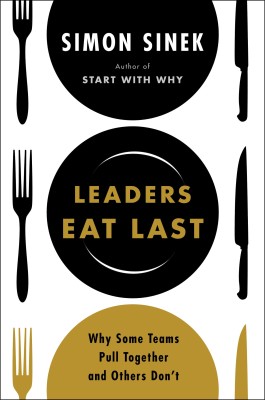
I can’t decide if Simon Sinek is a brilliant author or just skilled at pointing out the blindingly obvious. If you’ve heard of Simon Sinek, it’s probably because you saw his 2009 TEDx talk “How great leaders inspire action”. It’s 18 minutes well spent. He shares “the simplest model for explaining why some companies succeed and others don’t”. And there is the clue to whether he is brilliant or just pointing out the obvious. His skill is to simplify things and make them easy to understand.
Leaders Eat Last is a story about safety in the workplace. Not “100 days since our last accident” safety. In fact, he opens the book with a story about a pilot – incredibly called Johnny Bravo – whose bravery and disregard for his own safety saves a platoon on the ground. Sinek is teaching us about the emotional safety that leads to trust and bonding.
Sinek’s gift as an author is to write in compelling anecdotes. In his previous book, Start With Why, he uses stories from the Wright Brothers to the Walton family to illustrate that communicating from “Why” rather than “What” connects with customers. In Leaders Eat Last, he uses examples from the military, commercial flight controllers, distressed manufacturing plants, Goretex and Costco. Each example is offered to demonstrate his key point.
Leaders who serve employees first create successful businesses.
Leaders and anti-leaders
He takes on Milton Friedman and the primacy of the shareholder. It’s an example where employees are a low priority which leads to bad outcomes for business performance. If you were criticizing Sinek, you would say that his stories are cherry picked and don’t provide any robust scientific evidence to support his theory. It’s a fair criticism. But consistent with the theory of Start With Why, he’s simply communicating an idea.
Woven through the anecdotes that form the spine of his narrative are studies and theories from psychology, anthropology and biology. He cites Milgram’s controversial and borderline unethical 1961 study into abstraction. In this study Milgram demonstrated how willing people were to inflict pain on others as long as they were abstracted from the act. From biology, he explains how brain chemicals associated with emotional responses : endorphins, dopamine, serotonin & oxytocin serve and inhibit our ability to work in teams. He also covers cortisol – the stress hormone – and how it negatively affects our ability to perform. He dips into anthropology and stories from early man to justify his assertion that we all have a need to be with a group and work together to create safety.
Last Word
This book is a great read for a current or aspiring leader. Perhaps I’m biased because Simon has written a book that mirrors my beliefs about effective management, and even to some extent my beliefs about society more generally. I think that even if you’re skeptical about the importance of trust in the workplace, or believe that employees are commodities in the engine of the economy, this book might change your viewpoint. Your employees might thank you for that.
Whether Leaders Eat Last confirms or challenges your view of leadership, it’s and entertaining and informing read. At 219 pages of lightweight prose this book is worth the weekend it will take you to read it.
Leaders Eat Last by Simon Sinek is available in a variety of formats from Amazon.




